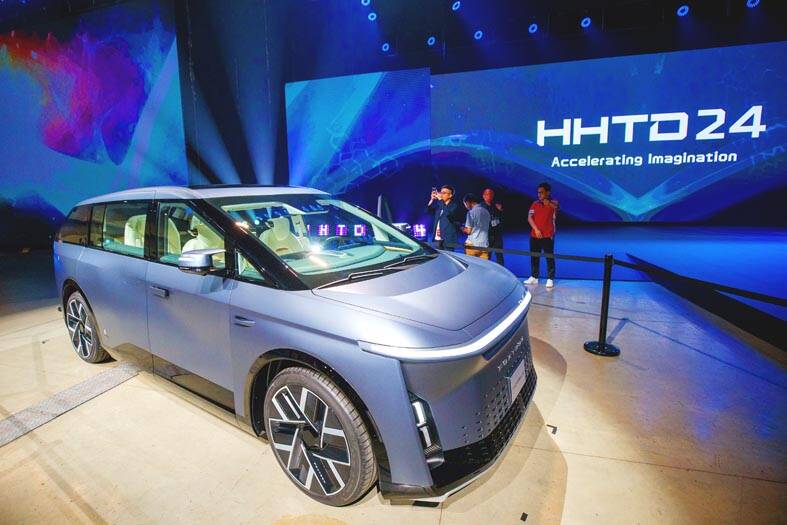Hon Hai Precision Industry Co (鴻海精密) has secured an agreement to make Mitsubishi Motors Corp electric vehicles (EV), scoring the first major customer for its fledging EV contract manufacturing business.
Hon Hai would begin building vehicles for Mitsubishi in Taiwan, a person familiar with the matter said.
It was unclear when production would actually start, but the first vehicles to roll off the assembly line would target Australia and New Zealand, the person said, asking to remain anonymous discussing a non-public matter.

Photo: Ritchie B. Tongo, EPA-EFE
Hon Hai representatives declined to comment on Thursday, while a Mitsubishi spokesperson said the automaker is always open to collaboration.
Hon Hai, known also as Foxconn, is trying to develop businesses from artificial intelligence (AI) servers to EV outsourcing to reduce its reliance on iPhones and consumer electronics.
However, it has made little headway on plans to assemble cars for the world’s biggest auto names, much as it does for smartphone and computer brands. It has introduced several model vehicles to show off its design and production capabilities.
However, building up the automotive arm would take years, Hon Hai’s EV business chief Jun Seki told Bloomberg TV in an interview in October last year.
Hon Hai has previously engaged in discussions to buy a slice of Nissan Motor Co, Mitsubishi Motors’ largest shareholder, to further its own ambitions.
Hon Hai chairman Young Liu (劉揚偉) told analysts on an earnings call last week that he expected to sign an auto contract with a Japanese client within months.
Last month, Liu also said that the company approached Nissan and Honda Motor Co about potential cooperation.
The news about Mitsubishi was first reported by Kyodo News.
Hon Hai’s potential deal to produce outsourced EVs for Mitsubishi Motors could advance its automotive ambitions by building credentials in vehicle manufacturing via an alliance with an established Japanese brand, analysts Steven Tseng (曾緒良) and Sean Chen said.
This could potentially pave the way for future pacts, they added.
Mitsubishi last year ranked as Japan’s eighth-largest automaker, with Nissan as its largest shareholder.

TAKING STOCK: A Taiwanese cookware firm in Vietnam urged customers to assess inventory or place orders early so shipments can reach the US while tariffs are paused Taiwanese businesses in Vietnam are exploring alternatives after the White House imposed a 46 percent import duty on Vietnamese goods, following US President Donald Trump’s announcement of “reciprocal” tariffs on the US’ trading partners. Lo Shih-liang (羅世良), chairman of Brico Industry Co (裕茂工業), a Taiwanese company that manufactures cast iron cookware and stove components in Vietnam, said that more than 40 percent of his business was tied to the US market, describing the constant US policy shifts as an emotional roller coaster. “I work during the day and stay up all night watching the news. I’ve been following US news until 3am

Six years ago, LVMH’s billionaire CEO Bernard Arnault and US President Donald Trump cut the blue ribbon on a factory in rural Texas that would make designer handbags for Louis Vuitton, one of the world’s best-known luxury brands. However, since the high-profile opening, the factory has faced a host of problems limiting production, 11 former Louis Vuitton employees said. The site has consistently ranked among the worst-performing for Louis Vuitton globally, “significantly” underperforming other facilities, said three former Louis Vuitton workers and a senior industry source, who cited internal rankings shared with staff. The plant’s problems — which have not

TARIFF CONCERNS: The chipmaker cited global uncertainty from US tariffs and a weakening economic outlook, but said its Singapore expansion remains on track Vanguard International Semiconductor Corp (世界先進), a foundry service provider specializing in producing power management and display driver chips, yesterday withdrew its full-year revenue projection of moderate growth for this year, as escalating US tariff tensions raised uncertainty and concern about a potential economic recession. The Hsinchu-based chipmaker in February said revenues this year would grow mildly from last year based on improving supply chain inventory levels and market demand. At the time, it also anticipated gradual quarter revenue growth. However, the US’ sweeping tariff policy has upended the industry’s supply chains and weakened economic prospects for the world economy, it said. “Now

COLLABORATION: Given Taiwan’s key position in global supply chains, the US firm is discussing strategies with local partners and clients to deal with global uncertainties Advanced Micro Devices Inc (AMD) yesterday said it is meeting with local ecosystem partners, including Taiwan Semiconductor Manufacturing Co (TSMC, 台積電), to discuss strategies, including long-term manufacturing, to navigate uncertainties such as US tariffs, as Taiwan occupies an important position in global supply chains. AMD chief executive officer Lisa Su (蘇姿丰) told reporters that Taiwan is an important part of the chip designer’s ecosystem and she is discussing with partners and customers in Taiwan to forge strong collaborations on different areas during this critical period. AMD has just become the first artificial-intelligence (AI) server chip customer of TSMC to utilize its advanced